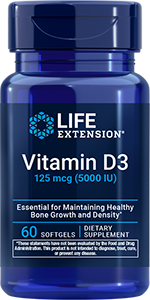Vitamin D

Vitamin D Benefits, Foods, Deficiency & Dosage
By Strength Tree
Vitamin D is a hormone the body synthesizes with the help of sunlight on the skin. Depending on your lifestyle and where you live during the winter months, you may not be getting enough vitamin D from the Sun.
Under the right circumstances, 10 to 15 minutes of sun on your arms/legs a few times a week can generate almost all the Vitamin D we need (1). The problem is the right circumstances like where we live, cloudy days, do you burn in the sun, sunscreen, time of year are some of the many factors.
Vitamin D Benefits
- Boosts Your Immune System - People who supplement with vitamin D3 are able to fight off colds and flus more effectively. In one study, children who took 1,200 International Units (IU) of vitamin D per day for 4 months during winter had stronger immune systems and a 40 percent reduction in their risk of seasonal influenza.
- Promotes Bone Health - While calcium is thought of as the main requirement for bone health, vitamin D is required for calcium assimilation. Without enough of it, the calcium you get through food or supplements gets excreted.
Research has found that vitamin D insufficiency can cause rickets in children and osteoporosis in adults. Vitamin D3 supplementation won't only protect you from bone loss, but also help increase bone density.
Products
- Reduces Your Risk of Disease - Vitamin D influences over 200 genes in the human body, any of which can be damaged when we become deficient. Getting adequate amounts of vitamin D helps prevent diabetes, cancer, heart disease, hypertension, Alzheimer's, arthritis and multiple sclerosis.
- Helps Stabilize Your Mood - Vitamin D is involved in mood regulation, and deficiency leads to higher rates of mood disorders. Fortunately, science has been able to link vitamin D3 supplementation with symptom improvement in people living with depression and anxiety.
- Improves Dental Health - Tooth decay, gum inflammation and bleeding gums are tell-tale signs of vitamin D deficiency. Just as your bones need adequate amounts of calcium and vitamin D, so too do your teeth. Without enough vitamin D, your teeth won't assimilate the calcium they need.
Supplementing with vitamin D3 plays a role in preventing cavities and gum disease, and helps you maintain strong teeth as you age.
Vitamin D2
Vitamin D2 is the synthetic form of vitamin D found in most supplements. According to research, vitamin D2 poses a risk of toxicity because it's synthetic and not easily assimilated.
Vitamin D3
Vitamin D3 is the natural form of vitamin D and is produced commercially as a supplement. Meanwhile, Vitamin D3 is non-toxic and significantly more bioavailable, allowing you to shore up any deficiency and reap the many health benefits of Vitamin D.
Vitamin D in Foods
Vitamin D occurs naturally in a small number of foods, such as;
- Cheese
- Egg Yolks
- Beef Liver
- Mushrooms (Portabella, Chestnut)
- Fish (Tuna, Halibut, Herring)
- Pork (Spareribs, Back Fat)
- Shrimp
Unfortunately, these foods only contain a small amount of vitamin D compared to what you need each day.
Vitamin D Deficiency
It is one of the most common nutrient deficiencies, and it's associated with several diseases, including bone, muscular and blood conditions.
Several studies have linked vitamin D deficiency to glucose intolerance. In one study, children who took 2,000 IU of vitamin D daily experienced an 88 percent reduction in their risk for developing diabetes later in life. Other studies have found that vitamin D3 diminished the proliferation of human cancer cells.
Your best bet is to supplement with Vitamin D3, which is a naturally derived, highly absorbable source that can prevent deficiency and the health risks that come with it.
Vitamin D3 Dosage
RDA (Recommended Dietary Allowances) (2):
- Up to 12 Months - 400 IU (10 mcg)
- 1 to 13 year olds - 600 IU (15 mcg)
- 14 to 70 - 600 IU (15 mcg) for Men and Women
- Over 70 - 800 IU (20 mcg) for Men and Women
References
- Time for more Vitamin D - Harvard Medical Publishing - https://www.health.harvard.edu/staying-healthy/time-for-more-vitamin-d.
- From Office of Dietary Supplements - National Institute of Health (NIH).
Conclusion
Unfortunately, it’s hard to eat your way to the recommended daily intake of Vitamin D because it is not found in many foods. Researchers say ten to fifteen minutes of sun at peak hours on your forearms can give you about 10,000 IU of Vitamin D.
If this is not obtainable because lack of sun or living in the Northern hemisphere than quality Vitamin D3 supplementation is a good solution.



